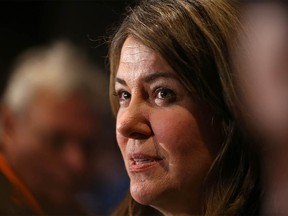
Alberta businesses seeking to decarbonize their operations through billion-dollar carbon capture and storage projects are finally seeing a payoff for their patience.
More than two years after Ottawa first unveiled its plans for a federal investment tax credit for carbon capture, utilization and storage developments, the Liberal government announced Tuesday it’s moving ahead with legislation for its incentive program — and measures designed to backstop the future price of carbon.
As part of the fall economic statement, federal Finance Minister Chrystia Freeland released more details on the long-awaited tax credit for CCUS. The Liberal government will proceed with required legislation to start paying incentives for eligible projects in the coming weeks.
The federal investment tax credit (ITC) would be available effective January 2022.
In Alberta, several companies, industry groups and the provincial government have been anxiously waiting for more information on the federal incentives for such projects, which capture carbon emissions and then store them deep underground.
“We’re very glad to see the ITC is making progress,” said Michael Belenkie, CEO of Advantage Energy and subsidiary Entropy Inc., which has developed a post-combustion modular carbon capture technology.
“It certainly can’t happen too soon, because we do have two projects which have been shovel ready for about a year and . . . our major investments in Canada have remained suspended, pending more details.”
The Calgary-based company has been waiting for Ottawa to release details on how to claim the tax credit and to provide certainty on the future price of carbon, through contracts for difference.
In Alberta, billions of dollars of proposed CCUS projects tied to petrochemical facilities, oilsands plants and power-generating facilities have been announced in recent years.
Energy consultancy Wood Mackenzie is tracking 80 Canadian CCUS projects, hubs and expansions in various stages of development, including 61 in Alberta.
Turning some of those proposals into reality is critical for decarbonizing Alberta’s industry, while also attracting investment and new jobs, as Canada strives to reach net-zero emissions by 2050.
“We are tracking at least a dozen — probably now more than 15 — proposed petrochemical investments in the province of Alberta, and nearly every one of those will involve (CCUS) activities,” Bob Masterson, CEO of the Chemistry Industry Association of Canada, said Monday.
“It’s going to need some support.”
-
 Alberta minister decries ‘delays’ on carbon capture tax credits following federal economic statement
Alberta minister decries ‘delays’ on carbon capture tax credits following federal economic statement -
 Danielle Smith says provincial carbon capture incentives expected in November
Danielle Smith says provincial carbon capture incentives expected in November -
 Varcoe: Canada pushes ahead on carbon capture projects, but still awaits green lights
Varcoe: Canada pushes ahead on carbon capture projects, but still awaits green lights
Initially proposed in the 2021 federal budget, the Trudeau government later announced in its April 2022 budget that the new investment tax credit will be set at 50 per cent for spending on equipment that is needed to capture CO2.
A 37.5 per cent credit will be provided for investments in equipment used in transportation and storage for such developments.
“It is really important for the energy industry in Canada because it extends the life of Canada’s largest industrial sector and maintains our competitiveness over the long term,” said Scott Crockatt of the Business Council of Alberta.
Several big-ticket projects are already being closely examined.
Dow Inc. has proposed building the world’s first net-zero carbon emissions ethylene cracker and derivatives complex at Fort Saskatchewan, which could potentially cost $10 billion to develop. Captured carbon dioxide would be sequestered off-site.
A final investment decision (FID) is expected soon, “pending completion of our subsidies and incentives with the Canadian federal government,” Dow chief executive Jim Fitterling said during an earnings call last month.
“We are absolutely convinced that our timing is right on the Alberta project. We get this one final issue nailed down with the Canadian federal government, we should have FID before the end of the year,” he said at the time.
The Pathways Alliance, a group of six major oilsands producers, wants to build a $16.5-billion carbon capture network in the province, with a CO2 trunk line connecting oilsands facilities to an underground storage hub near Cold Lake.
“We are pleased the federal government intends to legislate the Investment Tax Credit before the end of the year,” Pathways Alliance president Kendall Dilling said in a statement.
“We look forward to ongoing discussions with the federal and provincial government on other fiscal and policy tools for large-scale projects such as ours.”
Meanwhile, Edmonton-based Capital Power is working on a proposed $2.3-billion carbon capture and storage development near its Genesee Generating Station.
Capital Power senior vice-president Pauline McLean said the company is encouraged by Tuesday’s federal announcement.
“It will be great to see this tax credit in final form,” she said in a statement.

While the province has been working on its own CCUS incentive package, the Alberta government has expressed frustration with the Liberal government for dragging its feet on its program.
Businesses have been closely watching as the Biden administration assembled an aggressive incentive package with its U.S. Inflation Reduction Act last year, sparking concerns that investment dollars in decarbonization ventures will flow south of the border.
Industry leaders have also been waiting to see if Ottawa will establish carbon contracts for difference that can lock in a future national carbon price, providing more certainty for long-term investments.
Ottawa confirmed the Canada Growth Fund will be the key federal entity to issue carbon contracts for difference, allocating up to $7 billion of its $15 billion toward it.
However, it’s unclear how many projects will fit under this umbrella, given the sheer number of potential initiatives.
“We need a more robust entry into carbon contracts with industry to spur real investment,” Alberta Energy Minister Brian Jean said in a statement.
Premier Danielle Smith said last month her government expects to roll out its own incentive package for CCUS at the COP 28 climate summit, which begins on Nov. 30. An announcement is expected next week.
Chris Varcoe is a Calgary Herald columnist.
You can read more of the news on source



